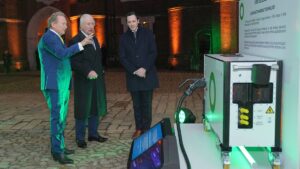FMG Results: A slow start for Fortescue in race for new iron ore record, but hey Twiggy’s drillin’ for rare earths

Pic: John M Lund Photography Inc/DigitalVision
- Andrew Forrest’s Fortescue sees shipments fall 3% YoY to 45.9Mt in first quarter
- FMG confirms its hunting rare earths in Brazil and copper in Argentina, but it’s not actively chasing lithium in the Pilbara right now
- Twiggy’s iron miner and green energy play still maintaining 192-197Mt guidance despite Iron Bridge production cut
Fortescue Metals Group (ASX:FMG) is drilling for minerals outside its core iron ore division including rare earths in Brazil as a weak producing quarter raised doubts over whether it would be able to hit another iron export record in FY24.
FMG may need to sell more low grade hematite to hit a 192-197Mt target, which it has maintained, after cutting production forecasts from its new Iron Bridge magnetite mine, which sells a premium 67% Fe concentrate.
Eventually expected to hit a production rate of 22Mtpa, Iron Bridge is expected to produce around 5Mtpa in FY24, down from initial targets of 7Mtpa.
Overall FMG shipped 45.9Mt in the first quarter, down 3% on the first quarter of FY23 when Andrew Forrest’s iron ore miner shipped a record 192Mt for the full year from Port Hedland.
Its C1 costs came in at US$17.93/wmt for the DSO product, but no costs are in yet for Iron Bridge.
FMG’s first shipment from Iron Bridge drew a 4% premium to the Platts CFR Index in July at US$131/dmt, though the delivery of its long delayed and over budget US$4bn high grade iron ore option has ironically come as demand for its staple lower grade ore has risen amid weak profit margins in Chinese steel mills, a dynamic its marketing head Vivienne Tieu expects to endure.
The narrowing spreads on low and high grade iron ore are a net positive for Fortescue. Its hematite sales came in at US$100/dmt in the quarter, 87% of the Platts 62% Fe benchmark.
That is still providing a war chest for its green energy division, where an as yet unspecified five projects will be taken to the board in the coming weeks for “FID”, with US$59 million also being tipped into exploration outside its main Pilbara metals business.
That includes something pretty interesting
FMG has signalled its interest in green metals like rare earths, copper and lithium in recent times, in line with the green shift its energy division is bringing on the $65 billion company.
It’s investing in both batteries and renewables and having its own supply of EV metals could be handy, leaving aside the marketability of those products to other participants in the battery, renewable and EV supply chain.
Small cap resources watchers will be familiar with Brazil and its propensity for ionic clay rare earths discoveries, notably Meteoric Resources (ASX:MEI) and its Caldeira project, one of the highest grade resources of its nature globally.
However, it is not actively focused on drilling for non-iron ore commodities in the Pilbara, where it holds ground adjacent to Wildcat Resources’ (ASX:WC8) Tabba Tabba discovery, which has made the one-time micro-cap this year’s best performing ASX explorer.
“The majority of our focus is still very much iron ore in the Pilbara, that capital number also includes the exploration work that we’re expediting in Gabon, where we’re continuing to get some positive results,” exploration director Nicholas Nitschke said on a call with analysts today.
“From a critical minerals perspective, we’ve got various drill programs underway both in Australia and also in Latin America. The primary focus is copper as well as lithium and we’re also doing some work initially on some of our rare earths prospects in our portfolio.
“We have some non iron tenure through WA and the Pilbara right now we’re not actively exploring and actively drilling. We’re not doing that.
“The work we’re doing in Brazil is focused on our rare earths activities and very much Argentina chasing large porphyries with a focus on copper.”
What’s the deal in Gabon?
That Gabon project, the Belinga iron ore deposit where FMG hopes to outline something similar in grade and scale to Rio Tinto’s (ASX:RIO) Simandou mine in Guinea, has seen some turmoil lately though.
The US officially declared a military coup there this week, almost two months after the ousting of Ali Bongo, whose family had ruled the West African nation for over 50 years.
FMG is still in study and drillout mode there, though it had previously guided plans to produce 2Mt of ore out of Belinga this year.
That will now be a more nominal 100-200,000t.
“2 million tonnes as we indicated before, that number was put out there as a marker to understand the supply chain, particularly the logistics corridor, can it be done and then building the connections within communities that we’re doing,” Metals CEO Dino Otranto said, also saying it remained committed to the project viewing the coup as ‘non-violent’.
“So that number currently we’re forecasting about I think 100-200,000t on an annualised basis. So I think it’ll be hover around those those types of low numbers, and like I said to you, it’s really for us to understand what the bigger project could look like.”
Meanwhile, Otranto said operating FMG’s own Iron Bridge magnetite plant would give it data to review a potential magnetite development with Sinosteel at its Midwest project.
FMG announced it would complete a 12 month ‘rapid project assessment’ in January 2022, with an option to acquire up to 50% of the orebody and 100% of proposed port and rail infrastructure at Oakajee, a site long proposed as a second port to foster the development of the Mid-West iron ore industry in WA going back to the 2000s boom.
“Obviously our key focus is getting our own magnetite process plant up and running. That then gives us really good data and synergies to continue to evaluate the Sino project,” Otranto said.
“There’s no doubt there’s a substantial body that we have a lot of interest on.”
Fortescue Metals Group (ASX:FMG) share price today
Related Topics

UNLOCK INSIGHTS
Discover the untold stories of emerging ASX stocks.
Daily news and expert analysis, it's free to subscribe.
By proceeding, you confirm you understand that we handle personal information in accordance with our Privacy Policy.








